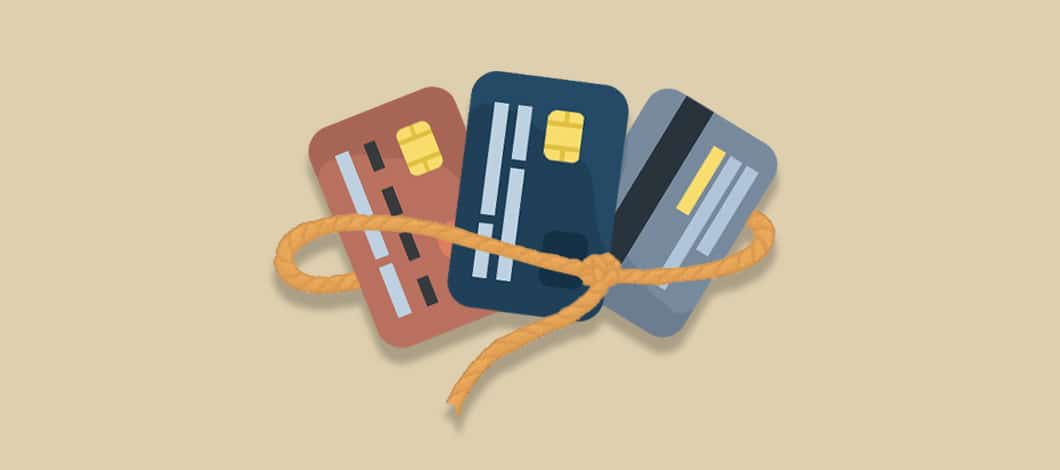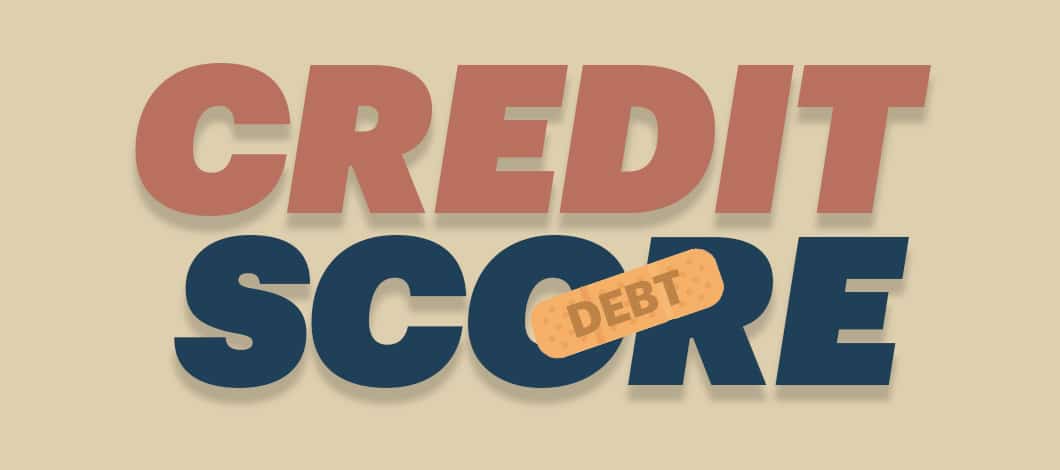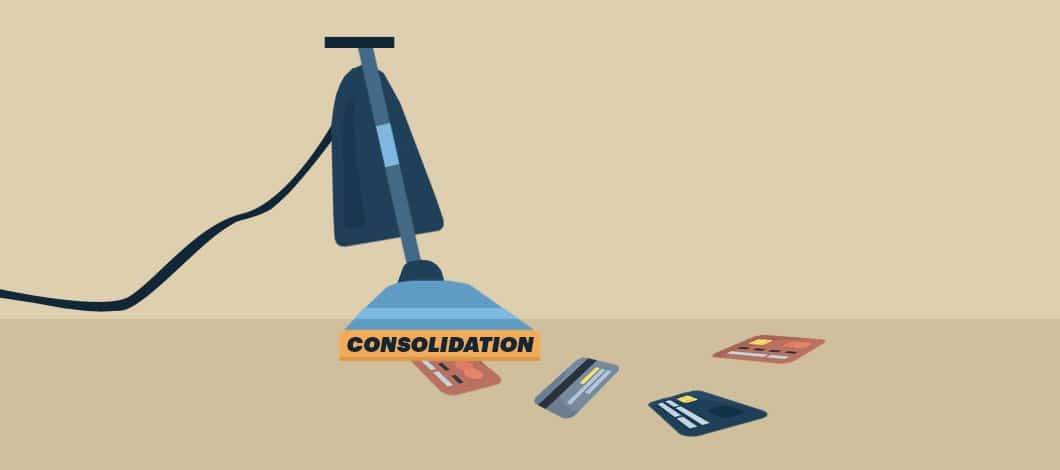You can consolidate business credit card debt to streamline your monthly payments.
Here’s our guide to how to do it. We’ll walk you through what business credit card debt consolidation is and what varieties are available. Then we’ll consider when using consolidation is a good option and what its pros and cons are.
Finally, we’ll review 7 of the best options for credit card debt consolidation.
What Is Business Debt Consolidation?
Business debt consolidation is a strategy for managing payments on bills such as credit cards by refinancing them in a way that lowers your monthly payment obligations to something more affordable. This may take forms such as transferring your debt to an account with lower monthly payments or using another financing source such as a loan to cover your debt.
In many cases, the trade-off for lower monthly payments may be higher interest rates resulting in higher long-term payments, although this depends on what form of debt consolidation you use.
What Are the Different Types of Business Credit Card Consolidation?
A number of common methods widely are used to consolidate credit card debt. These include:
- Credit counseling services: certified advisers who recommend ways to manage your money better so you can keep up with debt payments
- Debt consolidation plans (debt management plans): programs where you deposit a single monthly fee with a credit counseling service that manages payment arrangements with your creditors
- Credit card balance transfer: moving your balance from high-interest credit cards to ones with lower interest rates
- Credit card consolidation loan: taking out a loan with affordable monthly payments to pay down your credit card balance from multiple accounts
- Home equity loan or line of credit: using your home equity as collateral to obtain financing to pay down your credit card balance
- Loan using business assets as collateral: using commercial real estate or other assets as collateral to obtain loans for paying off credit card debts
- 401(k) loan: using retirement savings to pay down credit card balances
The variety of methods used to consolidate debt reflects how the specifics of your situation dictate which approach is best.
For Example
Methods that involve balance transfers and loans may depend on factors such as your credit score, which affect your ability to qualify for financing. In general, your credit score, the amount of debt you’re carrying and the immediacy of your cash-flow concerns are some key factors that help determine the best way to consolidate and pay off credit card debt in your specific situation. We’ll dig more into the pros and cons of different methods later.
Note that most of the methods mentioned here can be used to consolidate personal credit card debt as well as business debt. Depending on the relationship between your business and personal finances, you may find that consolidating your personal debt can help you manage your business debt or vice versa. Consider all your options in consultation with a professional adviser.

Why Do Businesses Consolidate Credit Card Debt?
The main reason for consolidating credit card debt is to reduce monthly payment obligations and alleviate cash-flow strains. By lowering the balance on your current credit card and shifting your payments to another form of financing with lower monthly payments, you reduce the strain on your finances and free up cash you can use to cover other expenses or grow your business.
Another reason for debt consolidation is to save money on long-term interest payments. If you can shift your balance to an account with a lower interest rate, you may pay less money in the long run.
In light of these rationales, there are a number of scenarios where a business would want to pursue debt consolidation:
- You can’t keep up with your current payment schedule because monthly payments are too high
- While you can afford your current payments, they’re high enough to tie up a significant part of your cash flow that would be better spent elsewhere
- You could save money on interest in the long term by shifting your balance to another account with lower interest
These reasons are distinct, but they aren’t mutually exclusive. For instance, you may want to increase your current cash flow as well as reduce long-term interest payments.
What Are the Pros and Cons of Consolidating Credit Card Debt
The specific pros and cons of debt consolidation vary with the method you use. In general, debt consolidation offers several potential advantages:
- Lowering your monthly payment obligations
- Reducing cash-flow strains
- Increasing available cash to pay for expenses or invest in expansion
- Reducing long-term interest payments
On the Other Hand
Depending on the type of consolidation you use, you may face some drawbacks:
- Not all debt consolidation services are reputable, warns the Federal Trade Commission (FTC), and choosing the wrong provider may backfire
- If you’re struggling with low revenue, you may not be able to keep up with your monthly payment obligations even under a debt consolidation agreement
- Your credit counseling service may not be able to negotiate settlements with all of your creditors
- If you stop making payments to your creditors under a debt consolidation agreement and your credit counseling service hasn’t negotiated an agreement, it may impact your credit score or make you liable for legal action
- You may have to pay fees for debt consolidation agreements
- It may take years to repay your debt in full
- You may need a good credit score or collateral to qualify for debt consolidation methods involving balance transfers or loans
- If you do a credit card balance transfer, your low introductory interest rate may expire after an introductory period
- Should you use home equity for loan collateral, you may be placing your home at risk in the event you default on payments
- If you tap into your retirement savings, it may reduce your retirement fund, cost you a penalty and fees if you default and place you at risk of having to repay your loan rapidly if you lose your job
These cons vary by provider, by debt consolidation type and by your financial situation. Do due diligence when researching providers and weigh your options carefully when considering which method to use.
Can You Do Credit Card Consolidation Without Hurting Credit Score Ratings?
Whether credit card consolidation will hurt your credit score depends on what method you use and whether you default on your obligations.
If you have a poor credit rating and you apply for credit cards or loans and get turned down, you may lower your score further. On the other hand, if you get approved and keep up with your payments, it may raise your score.

How to Consolidate Credit Card Debt: 7 Methods
The best way to consolidate credit card debt depends on your situation. Here are 7 different ways to do it, the pros and cons of each and some credit cards consolidation tips on how to use each method.
1. Credit Counseling Services
Before pursuing any other credit card debt management methods, first consider whether a better budgeting or financing strategy could help you keep up with your payments. A good credit counseling service can advise you on this and recommend whether other debt consolidation methods might benefit you.
The biggest risk with this method is choosing a bad credit counseling service. The FTC offers some guidelines for screening providers:
- Only consider credit counseling services that provide you with free information about themselves without requesting sensitive financial information from you up front
- Find out if the service is licensed in your state
- Before employing a service, check with your state attorney general and local consumer protection services to see if any complaints have been filed
- Ask what services the provider offers and what they charge
- Avoid organizations that won’t help if you can’t afford to pay
- Steer clear of providers whose representatives get paid more based on what you pay them
- Ask what privacy policies the organization follows to protect your financial information
- Don’t sign any agreements without reading and reviewing them carefully
Most reputable credit counselors operate through nonprofits that offer services through in-person consultations, online or over the phone. When possible, seek in-person services available through reliable sources such as universities, housing authorities, government agencies or military bases. Your bank or credit union also may offer credit counseling services.
2. Debt Consolidation Plans
Debt consolidation plans may be arranged through credit counseling agencies or other providers. They allow you to make a single, affordable monthly payment on some or all of your bills instead of multiple payments. This can make your payments more manageable and cut your interest rate without hurting your credit score, provided you keep up with payments.
The biggest disadvantages of this method are that you may have to pay fees and it may take a long time to repay your debt. Also, turning to an incompetent or shady counseling firm may leave you stuck with liability for payment arrangements that weren’t negotiated with your creditors. You can reduce this risk by screening your credit counselor using the criteria listed above.
In addition, find out about specifics such as:
- Which options besides debt management plans does your provider offer or recommend?
- How does their debt consolidation plan work?
- How are their monthly payment amounts determined?
- Can you afford their monthly payments?
- How often can you get status updates on your account?
- Can they get your creditors to reduce interest or fees, and can they verify this?
- Do they require any payments to creditors before their arrangement goes into effect, and can your creditors verify this?
- Can they get creditors to make your accounts current (re-aging your accounts)?
- How will their plan affect your credit score?
- Do they claim to be able to remove negative information from your credit report, (which legally can’t be done and is a red flag)?
Review any plan proposals in writing with input from competent counsel before agreeing to anything.

3. Credit Card Balance Transfer
Credit card balance transfers allow you to shift your payments to a card with a low introductory interest rate for a limited period, such as 12 to 18 months. If you qualify, it can be one of the best ways to manage debt.
A potential drawback is that you typically need a good credit score to qualify for a balance transfer. Also, you may have to pay a balance transfer fee. And note that your interest rate will increase after your introductory period expires.
4. Credit Card Consolidation Loan
Consider a credit card consolidation loan, which may be obtained from a bank, credit union or online lender. Such loans typically offer the advantages of low fixed interest rates and monthly payments, provided you qualify. Some lenders will pay your creditors directly.
As with credit card balance transfers, you may need a good credit score to qualify for this method of debt consolidation and you may pay fees. Applying and being turned down may lower your credit score. However, some lenders offer prequalifying applications, which won’t affect your score.
5. Home Equity Loan or Line of Credit
This method uses your home equity as collateral to obtain a loan or line of credit for paying down your debt. Your home serves as collateral. That means you necessarily don’t need a high credit score to qualify. Your payments can be spread out over a long period of low monthly payments. The interest rates are typically low.
However, you do need to have home equity to qualify for this type of debt consolidation financing. A bigger drawback is that you risk losing your home if you default.
6. Loan Using Business Assets as Collateral
This method works similar to a home equity loan or line of credit, except you use commercial real estate, equipment or other assets as collateral. The pros and cons are similar to using your home as collateral.
You don’t necessarily need a high credit score to qualify, and your repayment terms may be favorable. However, you must have business assets to qualify, and you place them at risk if you default.
7. 401(k) Loan
With this method, you draw from your retirement funds to cover your debts. This option entails lower interest payments than other methods and won’t affect your credit score. However, you need to have retirement funds to draw from to use this method, and if you do, you place them at risk.
Furthermore, if you default, you’ll face a heavy penalty and fees. If you lose your job, you’ll have to repay your debt by your next annual tax payment. Consider this method only as a last resort after exhausting other options.
Consider All Your Business Credit Card Debt Consolidation Options
Consolidating your business credit card debt can help you lower your monthly payments to make keeping up with your obligations more manageable. You can use a variety of methods to consolidate debt, including credit counseling services, debt consolidation plans and credit card balances as well as a variety of loan types.
Which option is best for you depends on factors such as:
- Debt balance
- Credit score
- Cash-flow needs
Fast Capital 360 can help you evaluate your financing options by matching you with lenders who meet your needs and qualifying criteria. If you’re considering debt consolidation, take a few minutes to fill out our free, no-obligation prequalifying application and see your loan options.










